
Wondering how much does it cost to rent a dump trailer? Get pricing, cost factors, and tips to help you budget for your next home project.
Get the right type of dumpster for your project


Whether you need junk removal for a residential demolition or renovation project or for standard waste removal for a commercial space, choosing the right type of dumpster can make your trash removal easier and more streamlined. In this guide, we’ll explain the four different types of dumpsters, what each one is used for, and some things to consider when choosing.
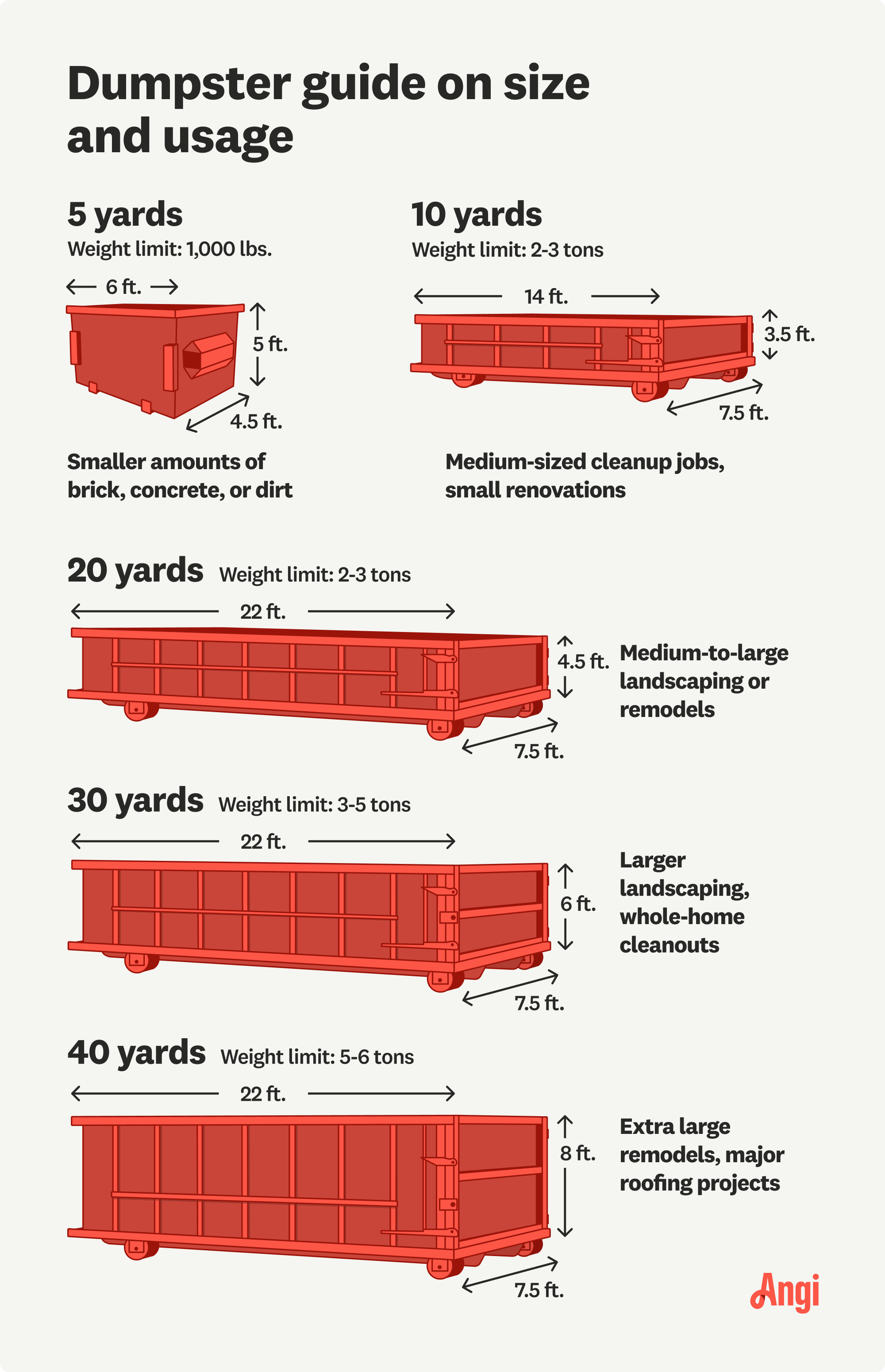
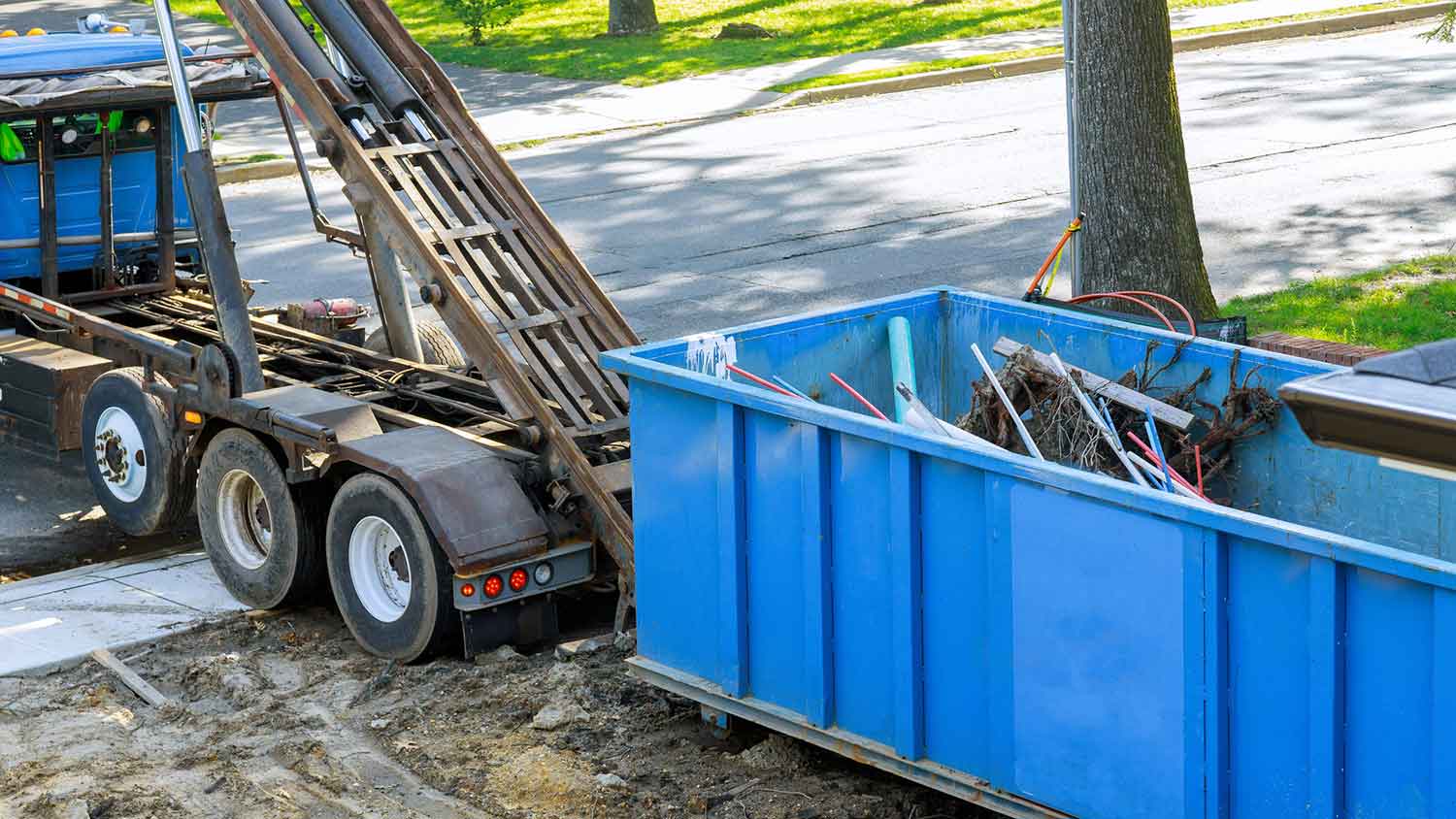
Roll-off dumpsters are probably what come to mind when you picture a dumpster. These are large, open-top dumpsters that roll off of a flatbed for easy delivery and pickup. When the dumpster is full, the flatbed will return and remove the entire dumpster with all of the contents from your property.
Roll-off dumpsters are primarily for construction and demolition projects that produce a lot of waste. They’re temporary and will often only stay on your property for one to four weeks, although the timeline can vary based on the local dumpster rental company, your project, and any limitations imposed by dumpster permits. Depending on your town’s regulations, you might need a permit if it sits in the street, interferes with a sidewalk or other public space, or blocks the view of motorists in the area.
Roll-off dumpsters are the largest type of dumpster, often reaching up to 40 cubic yards.
| Pros | Cons |
|---|---|
| Largest capacity | Limited timeline |
| Affordable | May require permits |
Best for: Construction or demolition projects
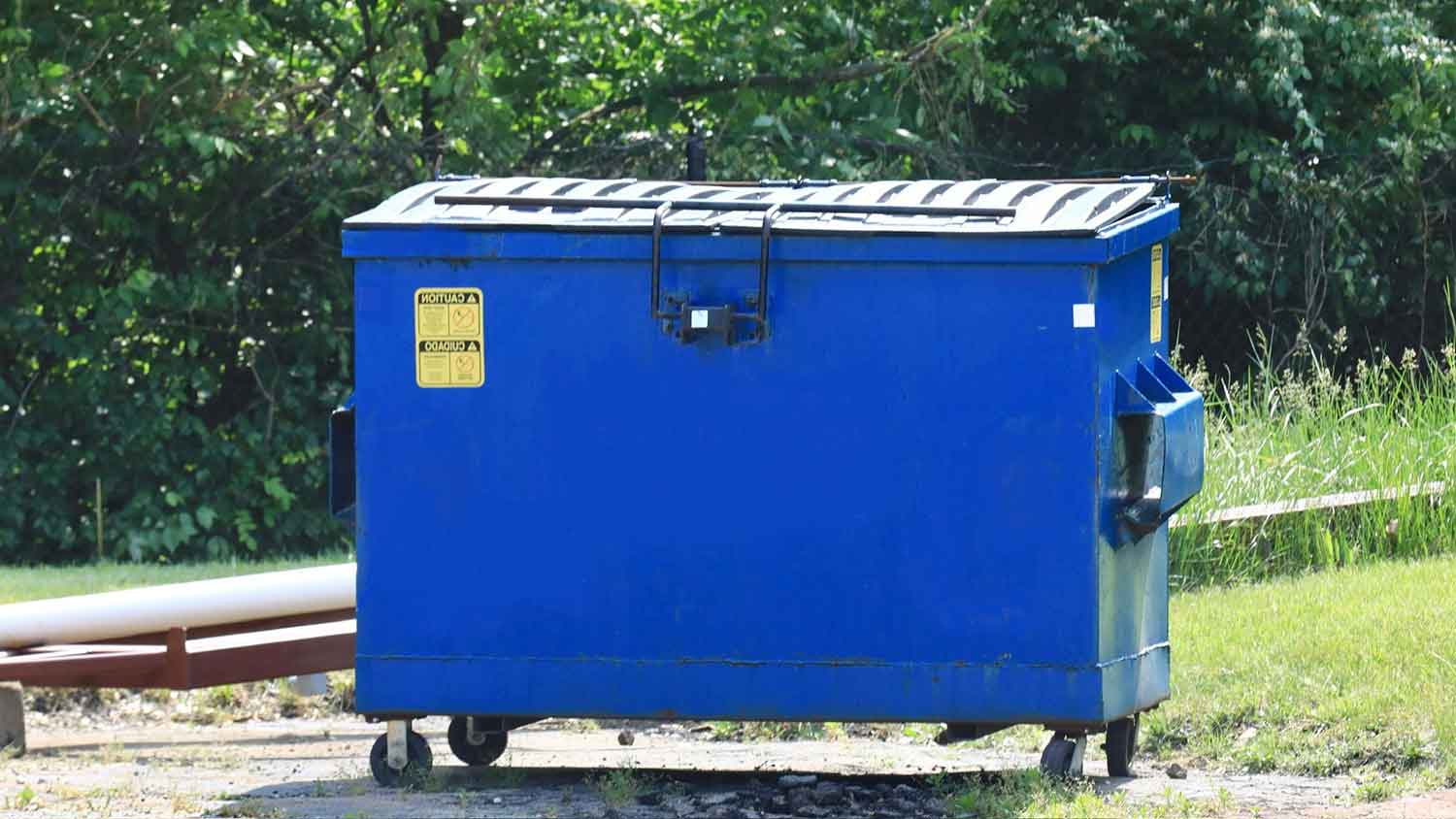
Front-load dumpsters are significantly smaller than roll-off dumpsters primarily because a trash removal company will empty them on a regular basis rather than hauling them away only when they’re full. As such, these dumpsters are ideal for ongoing garbage removal solutions from companies that haul trash away. You’ll often find them behind commercial properties serving as outdoor trash receptacles.
Front-load dumpsters have easily accessible lids, making it easy to dump garbage inside. When your trash removal company comes to empty a front-load dumpster, two prongs on the front of the truck slide into slats on either side of the receptacle, lifting the dumpster over the truck so that the trash falls out.
Front-load dumpsters are often between 2 and 8 cubic yards.
| Pros | Cons |
|---|---|
| Long-term service | Expensive over time |
| Easy trash removal | Small size |
Best for: Ongoing trash removal from commercial spaces
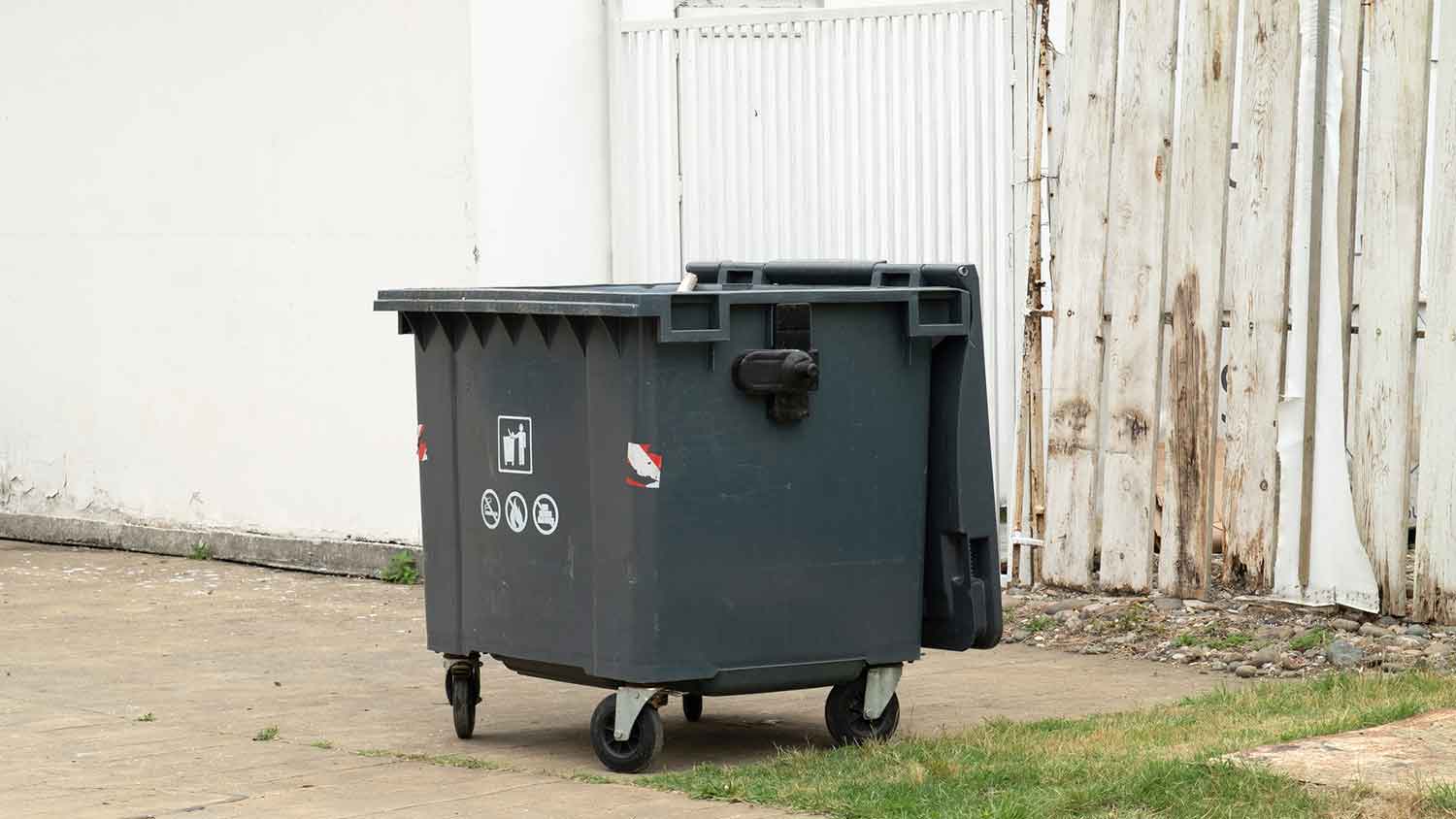
A rear-load dumpster works similarly to a front-load dumpster, with the primary difference being that the truck that comes to collect the trash loads the dumpster from the rear. Rear-load dumpsters are compatible with winches, which lift the dumpster rather than hydraulic arms, as a front-load dumpster uses.
Since these are similar to front-load dumpsters, they share the same use cases. They’re most popular behind commercial buildings, where property owners use them for ongoing trash removal. These also have lids that owners can easily lift to put garbage inside.
Rear-load dumpsters also often fall between 2 and 8 cubic yards.
| Pros | Cons |
|---|---|
| Ongoing service | Up to 8 cu. yds. |
| Easy trash removal | Long-term expense |
Best for: Ongoing trash removal from commercial spaces
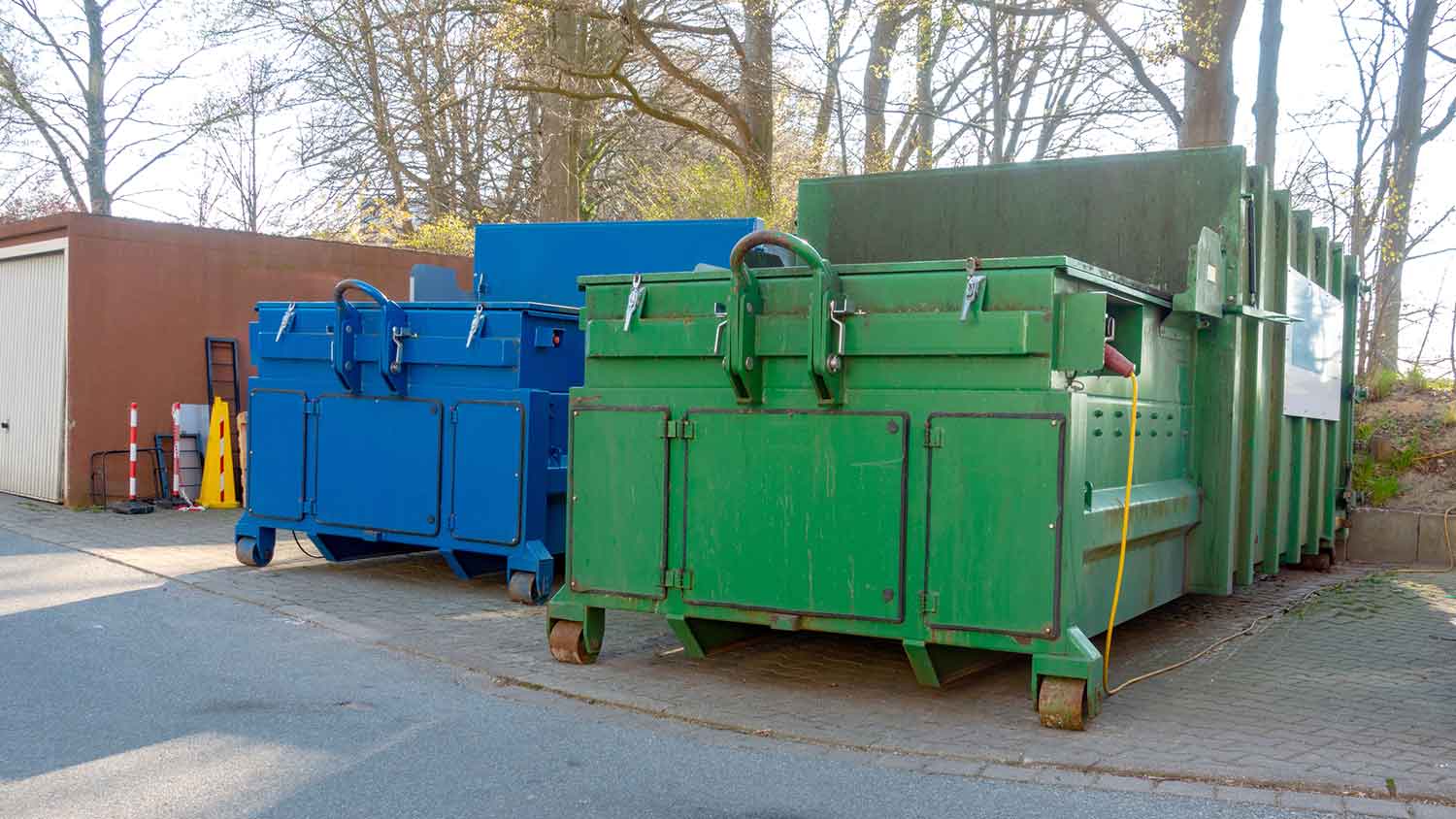
Compacting dumpsters are large, much like roll-off dumpsters, but they also double as a trash compactor. A mechanism inside crushes garbage to reduce the space it takes up, effectively allowing you to fit several times as much garbage in the same area.
The collection works similarly to roll-off dumpsters, meaning your dumpster company will come and remove the entire unit with all of the trash inside. However, since compacting dumpsters are most common for ongoing trash removal, the company will often deliver an empty compacting dumpster to replace the full one at the same time.
Compacting dumpsters can reach up to 40 cubic yards, but the compacting mechanism means you can fit more garbage inside than you would a roll-off dumpster of the same size.
| Pros | Cons |
|---|---|
| Largest capacity | Expensive |
| Easy trash removal | Long-term expense |
Best for: Ongoing trash removal from industrial buildings, large commercial buildings, or institutions
Getting the right dumpster for your needs can save you time and money. In addition to getting the right size dumpster, you should consider the following when choosing a dumpster type for your project.
Capacity: One of the most crucial things to consider is the dumpster size you need. If it’s too large, you’ve wasted money on upsizing your dumpster— too small, and you could delay your project or needlessly spend money on another dumpster rental. If in doubt, ask your dumpster rental company for a recommendation based on your project.
Cost: The cost of a dumpster will depend, in part, on the type you choose. Compactor dumpsters are the most advanced and, as a result, the most expensive. Front-load and rear-load dumpsters are the most affordable in a given time frame but can get expensive over time if you rent for ongoing trash removal. Consider your budget in addition to your debris removal needs.
Time: If you’re working on a construction or demolition project and just need temporary access to a dumpster, a roll-off dumpster is likely your best option. Front-load, rear-load, and compactor dumpsters are intended for long-term use for ongoing garbage removal.
Accessibility: Since trucks will need to come onto your property to drop off and pick up your dumpsters, you should consider how accessible the area is where you want your dumpster to sit. For example, a compactor dumpster might be ideal, but if you don’t have the storage space for the larger size or a wide road or path leading to the storage area, your dumpster company may not be able to deliver it or pick it up.
Debris type: Finally, consider the type of debris you intend to put in your dumpster. Roll-off dumpsters have some restrictions—like hazardous waste—but are often the most lenient when it comes to what you can dump. Front-load and rear-load dumpsters may restrict what you can dump based on the size, while compactor dumpsters have the most restrictions because everything that goes inside needs to be compatible.
You can't just throw anything into a dumpster rental. Fluorescent light bulbs, paint, tires, household cleaners, and food waste are just a few commonly prohibited items. Ask dumpster rental companies what you can and can't throw into their dumpsters before renting.
The average cost to rent a dumpster is $380. The price depends on the type of dumpster, its size, the weight of the contents, how long you hire it for, and what you put inside it. For example, you might pay $100 to rent a small front-load dumpster for a day to clear some junk from your garage or $800 for a week-long rental of a large roll-off dumpster to dispose of construction debris from a major home remodeling project.
You can save money when you haul your junk away rather than rent a dumpster. A few bags of yard waste should fit into the back of your car or truck. Even if you have to make a couple of trips to the landfill, the fuel and the landfill fees still won’t cost as much as renting a dumpster.
However, loading up the car and transporting heavy bags of trash or bulky furniture takes time, is hard work, and can damage your vehicle. If you have a big home or landscaping project with a lot of junk and debris to remove, the physical demands of dumping it yourself could be overwhelming, and it might not even be possible to fit big boards or appliances in your vehicle.
If you don’t want a dumpster in your driveway but DIY doesn’t appeal, hire a junk removal company near you to collect the debris directly from your home or driveway.
From average costs to expert advice, get all the answers you need to get your job done.

Wondering how much does it cost to rent a dump trailer? Get pricing, cost factors, and tips to help you budget for your next home project.
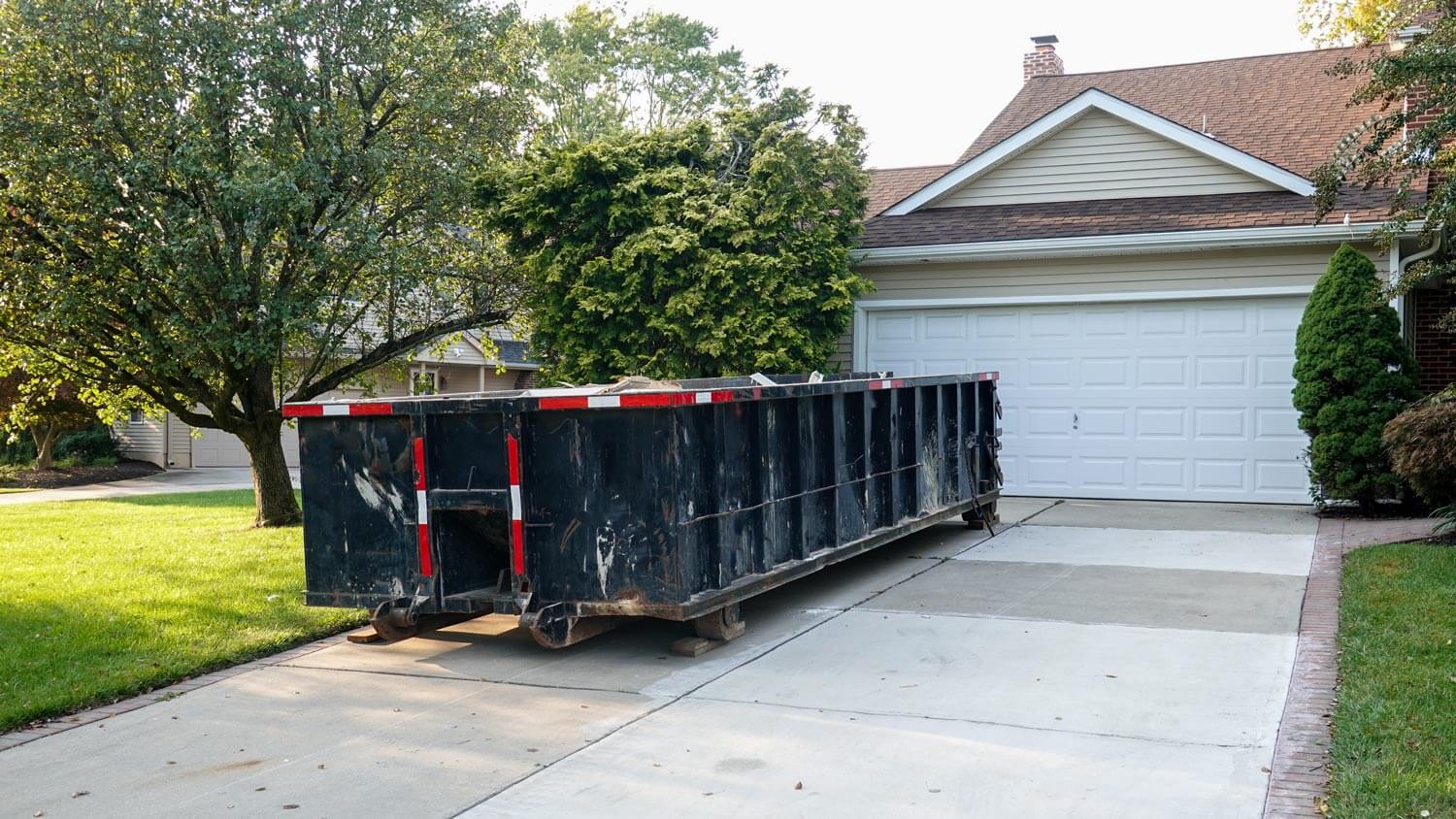
Renting a dumpster is more practical than you think. Use this guide to learn how much your rental will cost, the different dumpster types available, and tips to help you save.
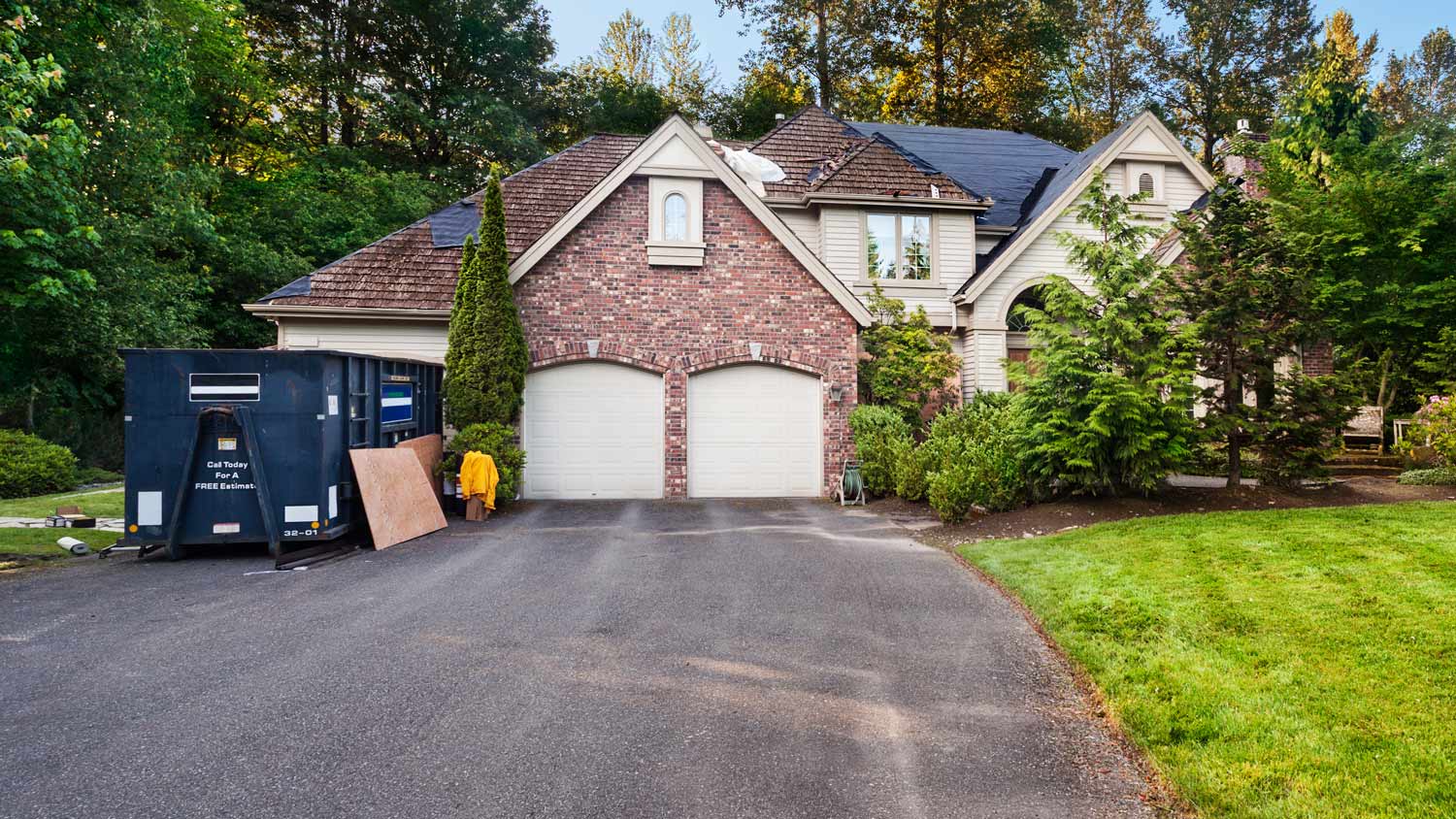
Dumpster rentals can range from days to months depending on your project and what you’re disposing of. Most homeowners rent a dumpster for one to two weeks.

Dumpsters are a convenient way to get rid of large amounts of trash or debris. Learn what size dumpster is right for your project.

Illegal dumping comes with many consequences, like environmental damage and hefty fines. Understanding what illegal dumping is can help avoid these issues.

Renting a dumpster allows you to get rid of large amounts of waste. Learn what you can put in a dumpster rental for your next big home project.